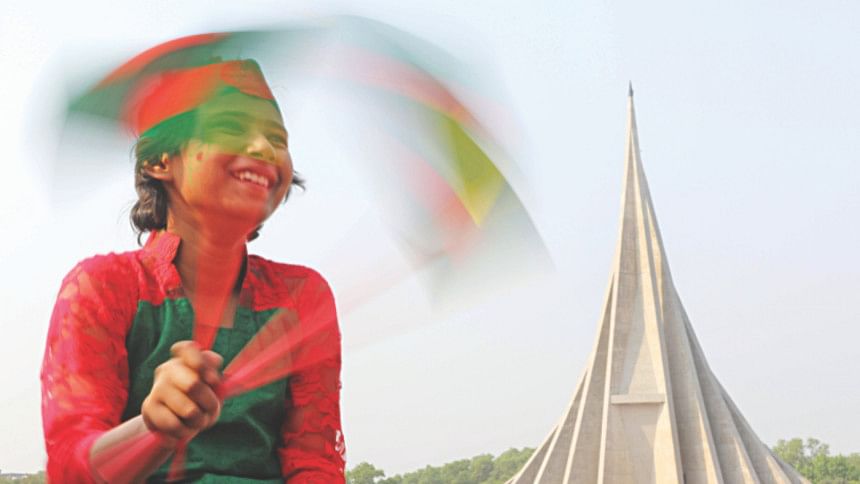The bonds that bind

The Independence Day celebrations across the country, combined with the national euphoria created by the Bangladesh Cricket team's World Cup performance, have left me wondering: What exactly is patriotism? It would be easy if we could define patriotism simply as unqualified love for one's homeland. The concept, however, is much more complex and interpretations may vary depending on the ethnic or geographical context and political or religious ideology. Of course, devotion to one's country is closely related to one's cultural and social affiliations. But then, how can we explain the fact that most immigrants are passionately devoted to their new country of choice, even though they may have limited cultural affinity to it?
The truth is, at a practical level, people love their homeland for different reasons. Some seek diversity while others may find comfort in homogeneity. Some may question a country's ideological progress while others may have blind faith in its ideals. Unfortunately, this variance allows politicians and vested interest groups to use patriotism as an instrument for manipulating people's emotions. We observe this phenomenon almost daily in the Bangladesh political arena. Both the government and the opposition parties lay exclusive claim to "patriotism," using disparate arguments. One side maintains that Bangladeshi patriotism is primarily defined by a strong commitment to the ideals of secularism and democracy, which formed the basis of the War of Independence. Whereas others insist a religious identity should be the leitmotiv of Bangladeshi patriotism. Within this highly contestable space leaders conveniently bend and distort facts and label their opponents as "traitors and collaborators" to suit their narrow political ambitions.
Since love and loyalty for one's country are difficult to measure empirically we tend to judge others using our subjective standards. This is not just a South Asian occurrence…
Although Americans claim that they are a nation where freedom of expression is of supreme importance, "patriotism" is frequently employed as a tool to discredit political opponents. For instance, citizens who spoke against the Iraq war were routinely branded as unpatriotic. The fact that the country waged a war based on inaccurate information and false assumptions did not deter the self-professed "patriots" to silence their critics by labeling them as disloyal. More recently, the former New York Mayor, Rudy Giuliani, said: "I do not believe, and I know this is a horrible thing to say -- but I do not believe that the president loves America." The ex-mayor clarified that he believes President Barack Obama is a patriot, but the president doesn't love America because he is "too critical" of the country. Giuliani's logic is intrinsically questionable since criticism is not necessarily indicative of dislike, or even indifference. Patriotism, like any form of love, is organic -- it mutates and grows to adapt itself to changing needs. People and nations continually evolve and there are new challenges that need to be overcome. Debating ideals and social and political norms is a healthy characteristic and should be a defining element of good citizenship. It's thus important for a country to nurture a mechanism for citizens to critique progress in a healthy and positive way.
This brings to mind another leading question: What does it actually mean to love your country? Does it mean you drape yourself in the colours of your flag and sing patriotic songs? Or does it entail much more in terms of making personal sacrifices for the greater social good? Yes, there is a romantic aspect to patriotism -- we grow up loving our motherland because it gives us a sense of belonging and an identity. However, we humans are selfish creatures and only a handful of people make significant contributions to their country for altruistic reasons alone. People expect certain basic privileges from the state -- like security, income opportunities and health care and education. And if the state fails to provide these services adequately, the bonds of citizenship become tenuous. It's therefore the responsibility of the leaders to instill confidence amongst the citizens that a better nation ensures a better life. Only then people will realise that "giving" to the country is an investment in their future rather than a mere benevolent act.
In any case, believing that one's homeland is perfect should not be a prerequisite for patriotism. I love Bangladesh but I strongly recognise that what it stands for ideologically is juxtaposed with the harsh reality that many citizens face because of gender inequality, skewed wealth distribution, limited religious freedom and unequal access to health care and quality education. I also understand that we cannot transform the country into a Utopia. But, an ideal Bangladesh should be part of our dream -- and we must continually strive to close the gap between reality and dream. For, what is patriotism without dreams for a better tomorrow?
The writer is a renowned Rabindra Sangeet exponent and a former employee of the World Bank.
E-mail: [email protected]

 For all latest news, follow The Daily Star's Google News channel.
For all latest news, follow The Daily Star's Google News channel. 



Comments